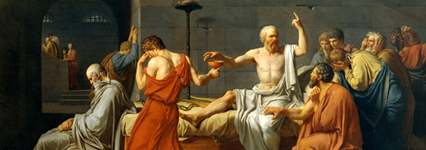Posts from — November 2015
The Wisdom of Ignorance

The more I live, the less I know, or perhaps the more I know how little I know. But this “ignorance” is strange, because historically, ignorance suggests darkness, as in, for example, the Dark Ages, and knowledge is associated with light, as in, for example, the Age of Enlightenment, yet I’ve found that my ignorance gives off a light, and that this light reveals a spaciousness in which things can stand forth and be seen for what they are, here and now, in the uncluttered present.
This has proved highly instructional, more so than any university course or program of study I ever undertook. No one in all of history has been a better student or teacher of this wise ignorance than Socrates, who spent his life in what proved to be a futile attempt to disprove a statement uttered by the Delphic Oracle, which, when asked by Chaerephon, Socrates’s friend, if anyone was wiser than Socrates, declared that Socrates was the wisest. Learning of this, Socrates was puzzled, since he knew that he possessed no wisdom, and so he set out on a lifelong mission to find someone who was wiser than he, with the idea that he would take this person back to the Oracle as irrefutable proof of the error of its pronouncement. Things, however, didn’t go as he’d planned, since everyone he engaged in dialogue who claimed to know this or that, to be wise in this sense, turned out not to know at all. One by one, as reported in Plato’s Dialogues, Socrates’s interlocutors, having been bested by his relentless philosophical and rhetorical virtuosity, took their leave of the conversation disabused of false notions. It began to dawn on Socrates that, while he knew nothing, he also knew he knew nothing, while other men, knowing nothing, believed they knew, and that therefore, he was, by that slight measure, wiser than they. The Delphic Oracle, it turned out, was spot on.
Today, the wisdom of the old Greek is needed more than ever. My counseling clients often get stalled on an unexamined assumption or false conclusion that has sent them racing, sometimes with great conviction and passion, in an unhelpful direction. They want to know what to do next, how to resolve this or that problem, but in a way, knowing is the problem—or at least thinking they know something they really don’t know at all. If they can come to see that they’re at a loss, a space opens where something new can show itself. The situation that led them to schedule a counseling session may seem daunting, overwhelming, even hopeless—yet often all that’s needed is to expose the imposter that has taken them hostage. It’s a great relief to put down the burden of false knowledge, and this is something that philosophical counseling is designed expressly to do. It takes away our misguided conclusions, and in this subtraction, creates an opening where before there was only constriction. In a manner of speaking, it exposes the most fortunate sort of ignorance, and in so doing, leaves us that much wiser and better off.
November 30, 2015 Comments Off on The Wisdom of Ignorance

